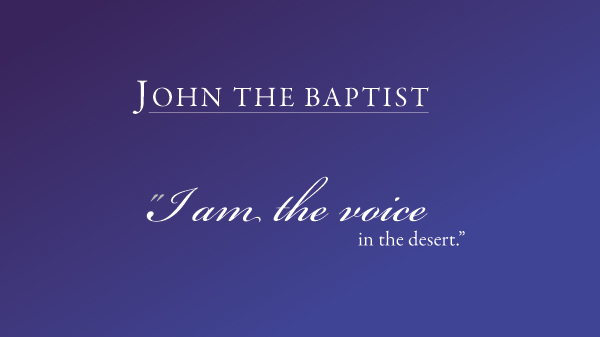
John the Baptist is the beginning of the Good News.  This is literally so, in the case of Mark and John, who do not include Infancy Narratives.  Regardless, in all four Gospels, John begins the proclamation of the Good News.
 
All beginnings, by definition, are moments of incompleteness, the commencement of something that is not yet fulfilled.  So, revivingly for those stuck in ruts or routines or periods of spiritual dryness, beginnings - and Advent is a season of beginnings - are filled with freshness, a sense that anything, especially something new, can happen.  Yet, for precisely that same reason, beginnings are also filled with uncertainty, some disorientation, even some fear and anxiety.  We long for the new, while we also fear it.  Who has embodied this dual, even oppositional, nature of the new more than John the Baptist?
 
So perhaps it's not surprising that when we first encounter John, we do so where many new beginnings in Scripture take place - in the precariousness of the desert.  From the Israelites' Exodus through the wilderness, to Isaiah's periodic vision quests on Carmel, to the Adventine gospels of the preaching of John the Baptist (and, still later, Jesus' own preparatory battle with the devil) - all of these beginnings occur in the desert.
 
In the midst of these Advent days, so filled with the anticipation of making new beginnings in our own life, perhaps there is something spiritually resonant about contemplating this nomadic prophet John, crying out, in the desert.  For whenever we begin something, we do so, not from a place of total strength and certainty, but with the future necessarily somewhat unknown, the outcome somewhat in the balance.
 
As St. Mark describes John the Baptist's desert, life there teeters on the brink.  No one's home is there, and judging by John's wardrobe and menu, strip malls are in short supply as well.  Imagine, then, the decision of the first disciples to make the trek from the known comfort of their villages out into this desert to listen to John.
Perhaps they journey to the desert for reasons similar to our own new ventures - not to be confirmed in what they already know about themselves, but to lose, at least momentarily, their daily comforts and securities, so as to encounter something fresh and new.  This they will encounter indeed, in the person and preaching of John.
 
The first disciples take a risk in journeying to listen to John.  These first disciples were dissatisfied with some aspects of their daily lives - whether it was personal, social, political, spiritual - and one day, they allow that restlessness to lead them to someone new.  They wander into the desert, let go of their daily, insulating routines and complacencies, and open themselves to the outrageous, yet somehow resonant and thus compelling, propositions of the Baptist.
 
Who knows how long they waited, in that desert of uncertainty?  What we do know is that one day, the Baptist, finally, proposed the new beginning they had so yearningly desired - "Look, there is the one we have been waiting for.  Follow him."
 
What is the message John preaches to prepare his listeners for this moment?  Repentance, conversion - a change in their normal routine.  A shaking up of their spiritual complacency.  As if to indicate that only those who have been shaken out of their complacency would be ready to follow at that decisive moment.  Perhaps, then, it was not a coincidence that Jesus went precisely to the desert - the destination of adventurers, risk-takers - to call his first disciples.  Would he find us there?
 
Perhaps in this story of the beginning of the Good News, in the desert with John the Baptist, we can see some semblance of our story, here in these first weeks of Advent.  All of us - no matter who we are - enter this season in some degree incomplete and restless.  This is great news!  Beginnings demand restless hearts, the embrace of, the facing up to, what has not been brought to life in us yet.
 
John the Baptist asked questions that cut to the core, and burned within the hearts of his listeners long after the words had been spoken.  Identifying the burning questions inside of us can be a great spiritual exercise this Advent.  In fact, the Gospels suggest that in the following of our restlessness - precisely the questions about ourselves, our world, our God, whose answers escape us, the questions and people that are on our minds and in our hearts when we go to bed and when we wake up - are often the promptings of the Holy Spirit . . .  or as John the Baptist might say:  "Look, approaching you in the desert is the One we have been awaiting."
Prayer
Lord, through the intercession of St. John the Baptist, stir up a holy restlessness within me, and help me to recognize in this Advent season my longing for you. Prepare the way of the Lord within me.
Like this reflection? Sign up here.
 Alliance for Catholic Education
Alliance for Catholic Education